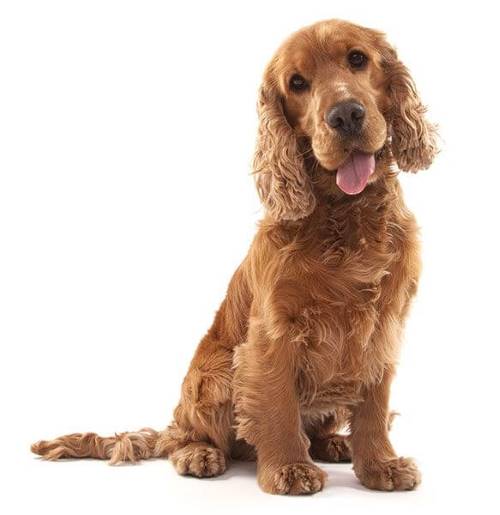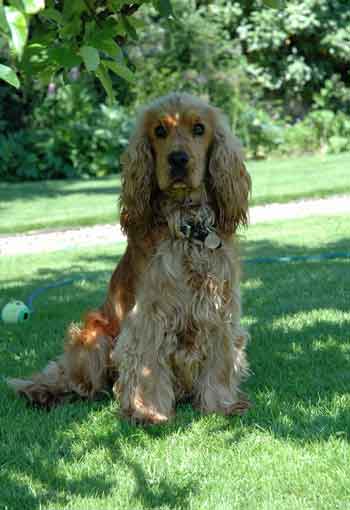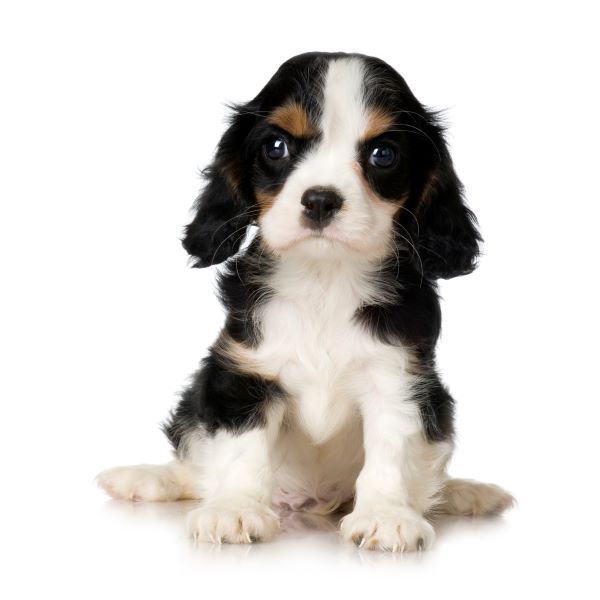- Home
- Cocker Spaniel Puppy Care
- 9 week old puppy schedule
9 Week Old Puppy Schedule To Help You Care For Your New Puppy!
This 9 week old puppy schedule will help you care for your new Cocker!
Puppies need a routine, so I've written this puppy care guide to help you to set up a daily care schedule to give your new puppy the stability he needs to grow into a healthy, well-mannered, confident adult Cocker Spaniel.
That can't be bad now, can it?
Your Puppy Care Guide To Keep You On Track
Until your puppy is fully house-trained, I recommend you keep him in a crate or a playpen when you're busy and unable to supervise him.
This way, you'll be able to relax knowing that he's safe and won't be able to get up to any mischief or pee on your favourite rug if you take your eye off the ball!
Crating can also help toilet train your puppy more quickly (because puppies don't like to soil their den), and it will allow you to take a little time out for yourself - and trust me, you'll need it!
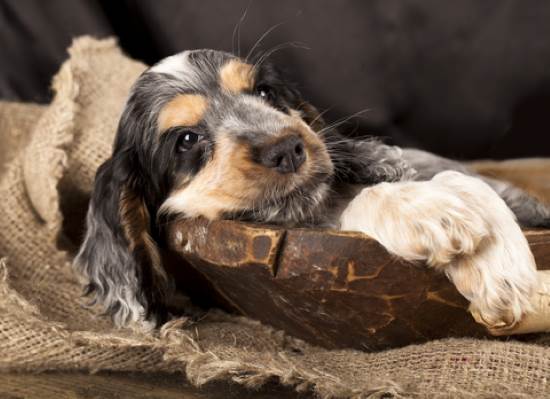 My Mum has a special puppy care schedule which takes good care of me!
My Mum has a special puppy care schedule which takes good care of me!Don't worry if the schedule below seems restrictive. You can easily change the activities and timings in this puppy care guide to accommodate your day.
9 Week Old Puppy Schedule: Mornings
7:15 am
As soon as you get up, take your puppy straight outside to see if he wants to go potty and praise him if he does the business.
If you find your puppy couldn't wait and has already messed inside his crate, clean it up without fuss; don't show disapproval.
8:15 am
Your puppy will be lively in the morning, so it's an excellent time to begin teaching him to play with his toys.
After the excitement of play, he may need to go outside to pee again, so you'll need to take him back out into the garden.
8:30 am
You'll see toilet breaks scheduled quite often in this puppy care guide. That's because, generally, puppies need to potty almost every hour.
8:30 is a good time to feed your puppy. However, timing is entirely your choice; whatever works for you.
If your puppy is crate-trained, I recommend you feed him inside his crate.
Continue to follow the breeder's recommendations, but generally, a puppy up to 4 months old will need feeding four times a day; split his food allowance into four small meals.
As feeding stimulates the bowels, he may need to go out to do his business again.
8:45 am
Your puppy will probably want to settle down and sleep after breakfast, so let him nap for an hour or so.
Either pop him into his crate or cuddle him until he drops off to sleep before placing him inside. I know which I'd prefer!
You can get on with your day while your puppy sleeps safely in his crate!
10:00 am
As soon as he wakes from his nap, take him outside for yet another potty break and encourage him to 'go pee pee' or whatever words you've chosen to use.
10:15 am
Have a little playtime with your puppy, and if he tries to chew your fingers or clothes, give him a chew toy and encourage him to nibble on that instead.
11:00 am
Introduce your puppy to his new collar and lead. This article on leash training your puppy will explain how to familiarise your puppy with his new collar and lead without drama!
Put his collar on, attach a lightweight lead and gently lead him around your house (or at least the rooms you plan to allow him in) or take him into the garden.
11:45 am
Feed your puppy his second meal and then take him into the garden to 'go potty'.
12:00 am
Put your puppy back into his crate (or dog pen) and let him sleep (or play) while you have lunch.
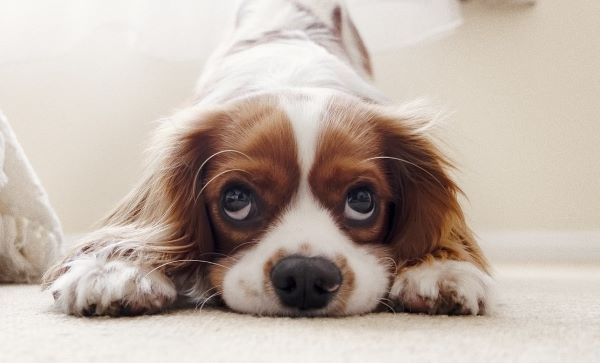 This gorgeous little Spaniel puppy has appealing eyes! He's so cute!
This gorgeous little Spaniel puppy has appealing eyes! He's so cute!9 Week Old Puppy Schedule: Afternoons
14:00 pm
Put your puppy's leash back on and take him outside to pee.
When he's done the business, walk him around your garden for a few minutes, or let him off the lead so that he can explore his new patch.
Having your puppy on his lead during alternate garden potty breaks will encourage your pup to do his business whilst on a lead when he's fully vaccinated and it's safe to walk him in the park.
You won't always be free to let him run free!
Bring your puppy back inside and let him play quietly with a soft toy in his crate.
14:45 pm
Feed your puppy his third meal of the day and take him outside again for another potty break.
16:00 pm
More play time. If you have children, allow them to join in but they should remain relatively calm and quiet (if that's at all possible!).
16:45 pm
Take your puppy outside again for another potty break.
17:00 pm
Time to sleep again; you know the drill!
18:00 pm
It's never too early to start your puppy's obedience training!
You should begin with the 'Sit' command as it is probably the easiest one for him to learn, and you'll use it often.
Remember to take him outside when you've finished the training to see if he needs to pee again.
18:45 pm
Time for his final meal of the day.
19:00 pm
Take him into the garden for yet another potty break before letting have another nap, if he wants to.
20:00 pm
Time to go potty again; a new puppy routine will always include lots of puppy pee breaks!
21:30 pm
Quiet cuddle (perhaps one more potty trip?) and bedtime.
Our Puppy Care Guide To Your Pup's First Night
Getting your puppy through his first night is probably your first puppy care challenge, but don't be alarmed if he cries during the first night in his new home, it's only natural.
I know, it's heartbreaking to hear, but he probably will so you'd better brace yourself.
Think about it, he's away from all he knows; his mother, his brothers and sisters, and all the sights and scents he's (so far) grown up with.
But how you react to your puppy during his first night may have an impact on the following nights to come, ie how quickly he settles in, and it may be the deciding factor on whether you get any sleep or not over the next few days!
Here's a suggestion on how to get your puppy through his first night.
9 Week Old Puppy Schedule: Extra Activities
In addition to the above puppy care schedule, you might like to introduce the following over the next few days:
Day 2
Your puppy's daily routine should include lots of teaching. We're going to keep it fun by teaching your puppy how to play with his toys, and at the same time, your fingers and toes are not his toys!
Introduce him to a few safe chew toys and teach him that he can bite his toys but not your hands!
Day 3
Socialisation is essential to your puppy's development.
It's vital to begin socialising your puppy (or continue where your breeder left off) as quickly as possible. Please read this article which will help you get started.
You must introduce your puppy to many situations and experiences to help your pup grow up to be a happy, confident and well-adjusted adult Cocker!
Day 4
More socialisation! Take him out in the car, either in a carrier (to stop him from roaming and keep him safe) or have someone cradle him gently.
Day 5
Continue with your pup's socialization program and do a little each day. Today introduce your puppy to different people and other children; better still, why not arrange to take him to school to meet lots of kids?
When Max was little, I often visited the local infant school just before the start of class to meet mothers and their children to allow him to be petted by many.
Day 6
Did I mention socialisation?
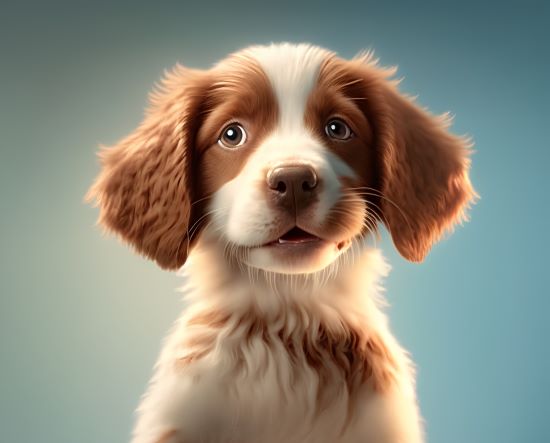 What a cute little puppy!
What a cute little puppy!9 Week Old Puppy Schedule: Summary
Puppies enjoy and need structure and routine in their lives.
If you stick to a routine similar to this puppy care guide, you'll be on the right track!
It's okay to mix it up a little to suit your circumstances, and once you get going, you'll get a feel for what's right for you and your pup.
Continue with a bit of socialisation every day (this is so important), and shouldn't be missed out or delayed. If your puppy is socialised correctly, he will grow into a happy, confident dog and less likely to develop behavioural problems.
What is the best piece of advice?
Continue with your puppy's training and socialisation.
Praise him each time he gets something right. If he pees in the garden, praise him like it's going out of fashion. If he sits the first time you ask him to, lavish him with praise.
If he does something you don't like or he gets it wrong, say, 'Too bad,' and move on. Don't praise him, but don't dwell on his mistakes. He'll get it right next time.
Happy puppy parenting!
Photo credits for your 9 week old puppy schedule:
1. Liliya Kulianionak at Dreamstime - https://www.dreamstime.com/royalty-free-stock-image-english-cocker-spaniels-puppies-image23082786
2. PicsbyFran at https://pixabay.com/photos/cavalier-king-charles-spaniel-puppy-5952324
3. Virtosmedia at https://www.123rf.com/free-photo_197929006_cute-puppy-with-bowl-full-of-dry-food-on-blue-background.html
